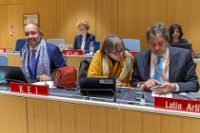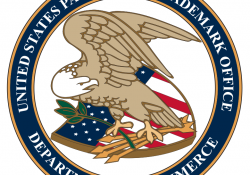SCCR24: Plenary statement of Brazil urging WIPO to advance its negotations on a Treaty for the Visually Impaired (19 July 2012)
This statement was delivered by Brazil on 19 July 2012 in the plenary of the 24th session of the WIPO Standing Committee on Copyright and Related Rights (SCCR). In this statement, Brazil stressed that negotiations on a Treaty for Visually Impaired Persons not be linked to discussions on a treaty for the protection of broadcasting organizations.
Mr Chairman,Quick Notes from NGOs intervention from the floor during SCCR24
WBU: we look forward to the revision tomorrow and we will study carefully. We see ourselves as technical advisors and we are available today and tomorrow for consultation.
STM (publishers); we have been supportive. But framework should not undermine publishers ambition….a legal instrument should be limited where there is no existing …it has to be limited to the essential. Should also be mindful to respect flexibilities. Authorized entities can be trusted By all stakeholders. that could be provided if operationaly prepared and ….
WIPO SCCR24: TPMs, Contracts, new articles
ARTICLE F1 OBLIGATIONS CONCERNING TECHNOLOGICAL MEASURES
Member States shall ensure that beneficiaries of the exception provided by Article C have the means to enjoy the exception where technological protection measures have been applied to a work.
SCCR 24: Focus is on “primary mission” of authorized entities
During the three hours of informal negotiations, I am told the discussions focused on among the definition, the first paragraph regarding “authorized entity”
[in SCCR23/7 Auhtorized entities]
means a governmental agency, a non-profit entity or non-profit organization that has as one of its activities to assist persons with print disabilities by providing them with services relating to education, training, adaptive reading, or information access needs, in accordance with national law.
WIPO SCCR24: still on “definitions” behind closed doors
The WIPO SCCR 24 delegates are still meeting behind closed doors (no NGOS and no streaming nor recording). I heard they are still talking about the definitions (see below) and that the 5pm plenary is delayed. Yesterday and this morning we heard quite a bit about “works” and “authorized entity”. If they agreed on these maybe they are now arguing over the meaning of “reasonable price for developed countries” and “reasonable price for developing countries”
SCCR/23/7 ORIGINAL: English DATE: December 16, 2011
ARTICLE A DEFINITIONS
For the purposes of these provisions
Continue Reading1 Quick Update on WIPO SCCR 24 Meeting on The treaty for People with Disabilities
Today is day 5 of the WIPO Standing Committee on Copyright and Related Rights which for over 2 years has been discussing the first ever treaty that would involved a limitation to copyright, in these case to benefit blind people as well as people with other disabilities. It is day 2 of plenary discussions regarding the treaty for people with disabilities.
WIPO SCCR24 What is an “authorized entity” and what is the fight about?
Today the discussion on the definition of “authorized entity” has started. It is one of the important and technical issues that could make a treaty good or bad, useful or ineffective.
An “authorized entity” or AE is the institution that provides the works in accessible format to the people with visual impairments who are the beneficiaries of the future treaty. Depending on how broad or narrow or inclusive v. restrictive the definition gets to be by the end of the negotiation, access is conditioned.
Some of the questions this morning:
SCCR24: Opening statement of the African Group
The World Intellectual Property Organization (WIPO) has convened the 24th Standing Committee on Copyright and Related Rights (SCCR) which will take place from 16 July 2012 to 25 July 2012 at its headquarters in Geneva, Switzerland. Ambassador Darlington Mwape (Zambia) is chairing the 24th SCCR. The morning session of the SCCR witnessed opening remarks by group coordinators. The following statement was delivered by Egypt on behalf of the African Group.
1 Open letter to those who collectively produced the May 23, 2012 statement to the WIPO SCP on the topics of patents and health
Open letter to those who collectively produced the May 23, 2012 statement to the WIPO SCP on the topics of patents and health (Copy of US statement available here: https://www.keionline.org/node/1416).
May 25, 2012
To each and everyone who worked on the SCP submission:
This letter outlines our concerns to the May 23, 2012 statement to the 18th Session of the World Intellectual Property Organization (WIPO) Standing Committee on the Law of Patents (SCP), on the agenda for patents and health.
In its opening, the USPTO said the following:
1 US statement to SCP 18 on the United States proposal on Patents and Health
The following is the statement read today by USPTO during a meeting of the WIPO Standing Committee on the Law of Patent, on the agenda item for patents and health. I’ll provide more commentary later, but in general, this was seen an aggressive attack on a proposal for work by the Development Agenda Group (DAG), and on the notion that countries should grant compulsory licenses on patents to address concerns over access or affordability of drugs.
[Update: KEI wrote to USPTO about the submission: /node/1420]
The USPTO statement follows:
SCP18


